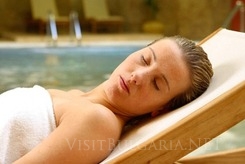Over one billion euro has been invested in the wellness and spa industry in Bulgaria over the past more...
| Search | Hotels / Accommodation | Vacations | Tours & Trips | Rent A Car | Transport | Flights | Conferences | Press Centre | Yachting |
- Holidays in Bulgaria
- All inclusive
- Beach
- Birdwatching
- Golf
- Health
- History
- Hunting
- Monasteries/ Religious
- Mountain biking
- Prom
- Rural
- Ski
- Spa & Wellness
- Trekking
- Water sports
- Weekend breaks
- Wine
- Conference
- Children Holidays
- Yachting
- Events
- Type of accommodation
- Hotels
- Apartments
- Villas
- Rural houses
- Destinations
- Aheloy
- Ahtopol
- Albena
- Apriltsi
- Arbanassi
- Asparuhovo
- Assenovgrad
- Bachkovo Monastery
- Balchik
- Bankya
- Bansko
- Banya (Karlovo)
- Banya (Razlog)
- Batak
- Beklemeto
- Belchin Bani
- Beli Iskar
- Belogradchik
- Berkovitsa
- Blagoevgrad
- Bodrost
- Bojichen
- Borovets
- Botevgrad
- Bourgas
- Bozhentsi
- Bratsigovo
- Brestovitsa
- Buzludja
- Byala
- Chepelare
- Cherepish Monastery
- Chernomorets
- Chiflik
- Devin
- Dimitrovgrad
- Dobarsko
- Dobrich
- Dobrinishte
- Dolna Banya
- Dospat
- Dryanovo
- Dupnitsa
- Dyuni
- Elena
- Elenite
- Elhovo
- Gabrovo
- Gela
- Golden Sands
- Gorna Oryahovitsa
- Gotse Delchev
- Govedartsi
- Grand Hotel Varna
- Harmanli
- Haskovo
- Haskovo Mineral Baths
- Hissarya
- Ivaylovgrad
- Kalofer
- Kamchia
- Kamen Bryag
- Kardjali
- Karlovo
- Kavarna
- Kazanlak
- Kiten
- Kom
- Koprivshtitsa
- Kosharitsa
- Kostenets
- Kostenkovtsi
- Kotel
- Kovatchevitsa
- Kranevo
- Kresna
- Kulinoto
- Kyustendil
- Lom
- Lovech
- Lozenets
- Lukovit
- Lyaskovets
- Madara
- Malko Tarnovo
- Malyovitsa
- Melnik
- Mezdra
- Momchilovtsi
- Montana
- Narechen Baths
- Near Golden Sands
- Nessebar
- Obzor
- Ognyanovo
- Osogovo
- Pamporovo
- Panagyurishte
- Panichishte
- Parshevitsa
- Pavel Banya
- Pavlikeni
- Pazardjik
- Pernik
- Petrich
- Pirdop
- Pleven
- Pliska
- Plovdiv
- Pomorie
- Pravets
- Preslav
- Primorsko
- Ravda
- Razgrad
- Razlog
- Ribaritsa
- Rila Monastery
- Riviera
- Rousse
- Rusalka
- Samokov
- Sandanski
- Sapareva Banya
- Semkovo
- Sevlievo
- Shabla
- Shipka
- Shipkovo
- Shiroka Laka
- Shkorpilovtsi
- Shoumen
- Silistra
- Sinemorets
- Sliven
- Smolyan
- Sofia
- Sopot
- Sozopol
- Srebarna
- St. Constantine & Elena
- Stara Zagora
- Starozagorski Baths
- Sunny Beach
- Sunny Day
- Sveti Vlas
- Svilengrad
- Svishtov
- Targovishte
- Teteven
- Tran
- Trigrad
- Troyan
- Tryavna
- Tsarevo
- Tsigov Chark
- Uzana
- Varna
- Varshets
- Veliko Tarnovo
- Velingrad
- Vidin
- Vitosha
- Voneshta Voda
- Vratsa
- Vratsata Gorge
- Yagoda
- Yakoruda
- Yambol
- Zlatitsa
- Zlatograd
- Bulgaria Guide
- General information
- Bulgarian Monasteries
- SPA Bulgaria
- The Black sea
- History
- Geography
- Maps
- Weather
- Airports in Bulgaria
- Webcams
- Forums
- Mountains in Bulgaria
- The Balkan Mountain Range
- Rila Mountain
- Pirin Mountain
- The Rodope Mountain
- Vitosha Mountain
- Travel Arrangements
- Visit Bulgaria
- Visa Requierments
- Choose Destination
- Flights to Bulgaria
- Transport in Bulgaria
- Advice
- Currency
- Official Holidays
Subscribe to newsletters to receive our hottest offers:
Spas in Bulgaria
The SofiaEcho weekly

What is so special about spas in Bulgaria? The answer is simple: thermal waters abound. There are more than 500 springs with temperatures varying between 20 and 100 °C. Just take a look at the centre of Sofia, next to the mosque, and you will see people filling up bottles with steaming water. Let’s hope the renovation of the beautiful bathhouse nearby will soon be completed. Legend has it that Sofia takes it name from the daughter of the Byzantine emperor Justinian because it was there that she was healed from an unknown illness, thanks to the purity of the air (well, let’s forget about that one) and to the virtues of mineral waters.
In fact, mineral waters in Bulgaria were used by the Romans for healing and heating purposes as early as the first century BCE. The largest spa towns – Sandanski, Kyustendil, Hisara, Velingrad and Sapareva Banya – have developed in places of old Thracian and Roman residential areas.
Now, springs are divided into cold (to 37 °C – the temperature of the human body), warm (37-60 °C) and hot (above 60 °C). Generally, the lowest temperatures are found in the northern part of Bulgaria, where the town of Vurshtets has the warmest water – at a whopping 38 °C. The hottest temperatures are, as an average, found in the south-central city of Velingrad (50-90 °C), with the town of Sapareva Banya, earning recognition as the hottest spring in the country, at 101.4 °C.
Under communism, from the 1970s on, the spa system was actively promoted and a wide range of diseases were treated in about 40 resorts under the supervision of the Ministry of Health. With the transition, government subsidies were drastically reduced and many of those spas were left to deteriorate. Take the old spa in Momin Prohod, just an hour away from Sofia: it used to be famous, and is still operational – but with standards that would probably not appeal to Westerners.
In terms of health, what can you expect from a spa? Preventive and alternative medicine based on the use of herbs and mineral waters has a rich tradition in Bulgaria, and spas were meant to treat malfunctions and diseases such as chronic respiratory malfunctions, locomotory system and neurological diseases, digestive system, kidney or gynecological diseases, skin or allergic problems, rheumatism – all this depending on the composition of water. The treatments include the drinking of mineral water, healing baths, inhalation and/or aqua-gymnastics.
However, most people now look for relaxation and rejuvenation, and new spas offer a whole range of corresponding procedures and facilities, such as hydro- and thalasso-therapy, massages, skin care treatments, aromatherapy, warm stones, mud baths, cosmetic baths, Jacuzzi, sauna, hammam… Therapists are usually available on the spot, and it is best to look for their advice as well as for information on the composition and effect of thermal waters before starting any therapeutic procedure.
On the whole, the use of thermal waters – be it for healing, recreational or heating purposes – is still underdeveloped in Bulgaria. In Varna, hot water flows freely into the sea, not without having formed a natural pool on the beach, allowing children to splash happily about. In Banya (the Bulgarian word “banya” means “bath”), between Bansko and Dobrinishte, where a statue of Lenin still adorns the main square of the village, hot water is left steaming in the open air – but appearances are misleading: investors have been pushing prices up for the last couple of years, and most spare plots are earmarked for construction.
With spa tourism in fashion, the effects of privatisation are now visible as more and more luxury spas are opening throughout the country.



















